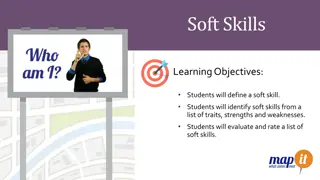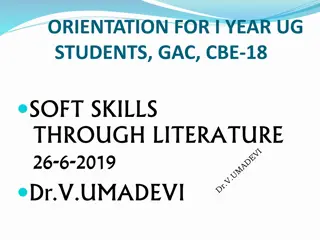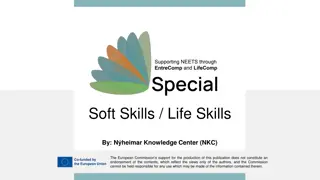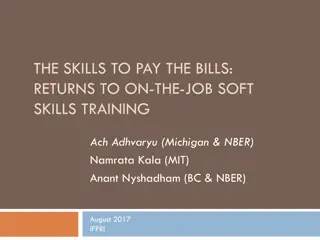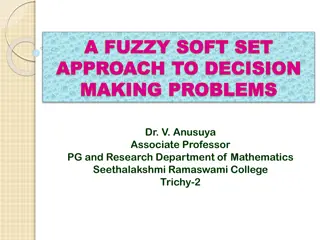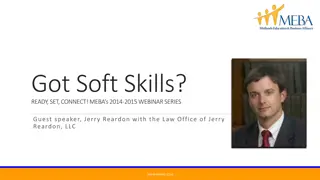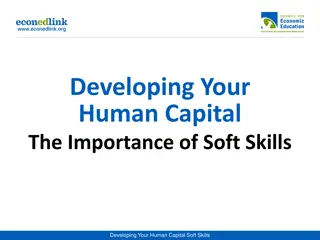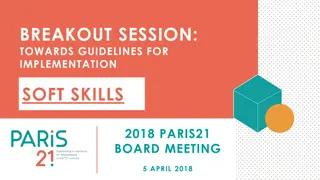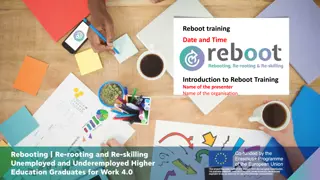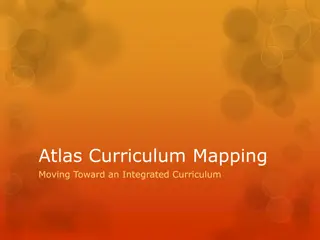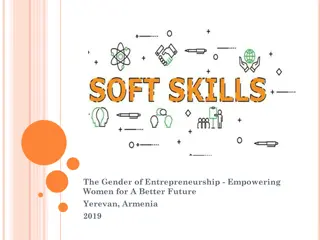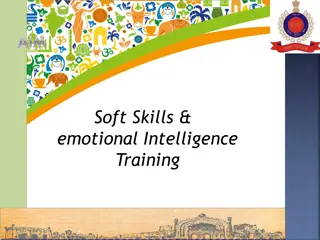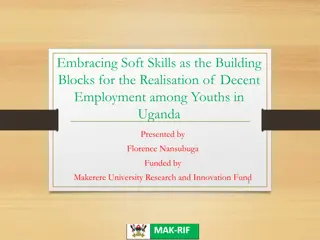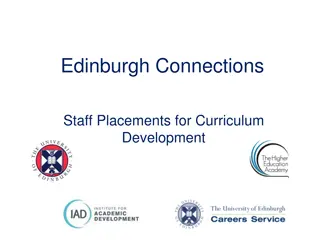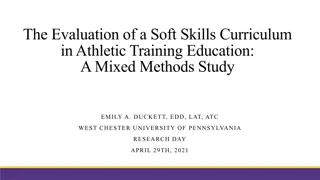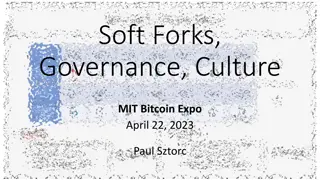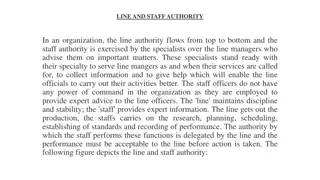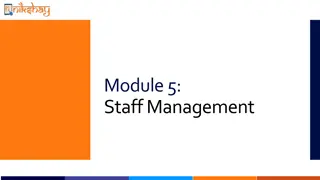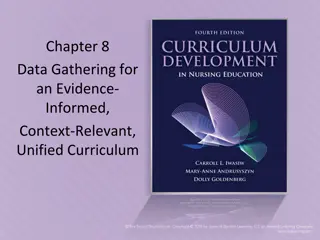Developing Soft Skills in Curriculum: Staff & Student Perspectives
This project discusses the importance of developing soft skills in education, focusing on the perspectives of staff and students across European universities. It highlights the collaboration between institutions to enhance skills for modern workplace demands, emphasizing self-management, critical thinking, teamwork, and communication. The initiative aims to bridge the gap between formal education and industry needs in Ukraine, promoting a more adaptive and efficient workforce.
Download Presentation

Please find below an Image/Link to download the presentation.
The content on the website is provided AS IS for your information and personal use only. It may not be sold, licensed, or shared on other websites without obtaining consent from the author. Download presentation by click this link. If you encounter any issues during the download, it is possible that the publisher has removed the file from their server.
E N D
Presentation Transcript
Exchanging Practice across Europe: Developing Soft Skills in the Curriculum: Staff and Student Perspectives. Dr Alison Jane Pickard Professor Rebecca Strachan Faculty of Engineering and Environment, Northumbria University March 2016
Background: IMProving the Efficiency of Student Services (IMPRESS) Project Ministry of Education and Science of Ukraine : Ukrainian Association of Students' Self-Government Taras Shevchenko National University of Kyiv V.N. Karazin Kharkiv National University Donetsk National University (now located in Vinnytsia) Ivan Franko National University of Lviv EU Partners: Project Coordinator Northumbria University(United Kingdom). European Students Union(Belgium) University of Cordoba (Spain) Fundecor (Spain) Tomas Bata University, Zlin (Czech Republic) British-Ukrainian Reach Out Centre (United Kingdom) Shoofly Publishing Co (United Kingdom).
Skills for a Modern Ukraine World Bank Group, 2015. Key Findings Ukrainian employers demand advanced cognitive, socio- emotional, and technical skills. Existing formal education and training systems have been slow to adapt to new skill demands. Ad hoc and uneven nature of policy reforms in Ukraine has led to outdated education, training, and labor market systems. Policy Agenda Build foundational skills for new labor market entrants. Enhance the quality of higher education and employment institutions to build advanced skills of the current working-age population and future workers. Improve the institutional environment to ease the use of current workforce s skills.
Work Package 4 Soft Skills Self management Peer to peer interaction Critical thinking Soft Skills Group/Teamwork Reflection Academic debate Communication
Year 1 Preparation Northumbria Team visit to Donetsk National University to meet all partners https://www.impress-eu.com/#!meet-the-soft-skills- team/xp74n 8 staff identified for the collaborative training programme 2 from each location in Ukraine March 2014 training on campus at Northumbria Google group established as a collaborative workspace. New approach to L&T
Outcome Soft Skills for Professional Development. Level 6 / 20 credits, MLO s: Construct personal strategies for learning and achievement - reflective practice Process information critically in the construction and defence of logical arguments. Communicate clearly and precisely to interested audience in a range of different contexts Reflect on and react to, constructive criticism provided by others in a respectful and professional manner. Work effectively within a team demonstrating an awareness of personal strengths and individual contributions
Year 2 2 further members of staff are trained at each home university by the original 8 Module materials refined and delivered to a pilot group in each university Team and students evaluate the pilot Year 2 didn t go exactly to plan!
However, through determination Module resources: Web site https://www.impress-eu.com/ eBook Assessment yet to come
Year 3/4 Module validated by Northumbria University Module integrated into the curriculum where appropriate Offered as a stand alone course for additional credits. Evaluation of full roll out at each location by staff, students and steering group.
Final workshop and Opportunities A new way of teaching in Ukraine Attitude of students Staff / Student expectations
Flipping the classroom 8 Professors 8 Students It is important that students bring a certain ragamuffin, barefoot irreverence to their studies; they are not here to worship what is known, but to question it. Jacob Bronowski, (1973) The Ascent of Man. BBC.
Cultural difference Group work So what if I got 80% for my contribution? if the collective mark was 20% then I deserve 20% too it s my responsibility if my team members didn t contribute.
Student perceptions Difficult to understand soft skills out of context Why learn how to cite using Harvard if you don t have a paper to write and a reference list to prepare? Why study team working when you have no need to work in team? why study research methods when you have no research to do? Why learn how to communicate if nobody is listening? Point of need or perceived usefulness
References Bloom B S (1956) Taxonomy of Educational Objectives: The classification of educational goals. McKay. New York. Downes, S. (2007), Learning networks in practice, National Research Council of Canada, Emerging Technologies for Learning, Vol. 2, 2007, Becta Hampton, M. (2010). Reflective writing: a basic introduction. Accessed 17 July 2015, http://www.port.ac.uk/departments/studentsupport/ask/resources/handouts/writtenassignments/filetodown load,73259,en.pdf Levine, R. B., Kern, D. E. & Wright, S.M. (2008). The impact of prompted narrative writing during internship on reflective practice: a qualitative study, Advances in Health Science Education, 13, 723 733. DOI: 10.1007/s10459-007-9079-x Reason P. & Bradbury H. (2011). Handbook of action research: participative inquiry and practice. London: Sage Shenton, Andrew K. & Pickard, Alison J. (2014) Evaluating Online Information and Sources. Minibook Series: UK Literacy Agency. ISBN-13: 978 1 897638 86 6 Pickard, Alison J. (2008) Rich pictures: Researching the role of peer interaction for pupils using the internet. Popular Narrative Media. 1(2) pp:169-181 Race, Phil (2010) Making Learning Happen. Sage, London Strachan, R., Liyanage, L. (2015) Active Student Engagement: The Heart of Effective Learning. Chapter in Global Innovation of Teaching and Learning in Higher Education, Professional Learning and Development in Schools and Higher Education, 11, pp. 255-274, Springer International Publishing. Strachan, R., Pickard, A., Sambell, A., Beautyman, W., Bryson, Craig (2010) Learning through peer assessment and support It s good for you! NORTHUMBRIA/EARLI SIG ASSESSMENT CONFERENCE: Assessment for Learners 1-3 September 2010 Slaley Hall Hotel, Northumberland, UK.


